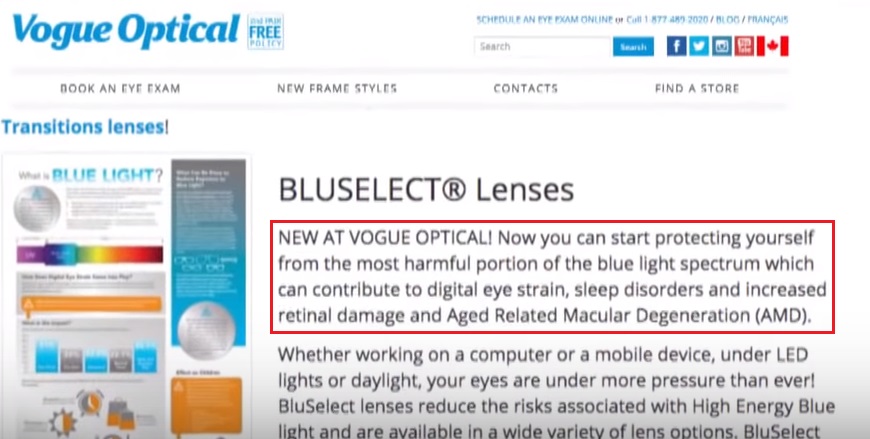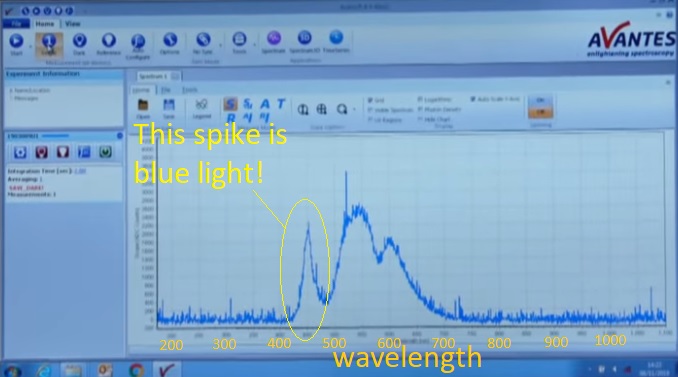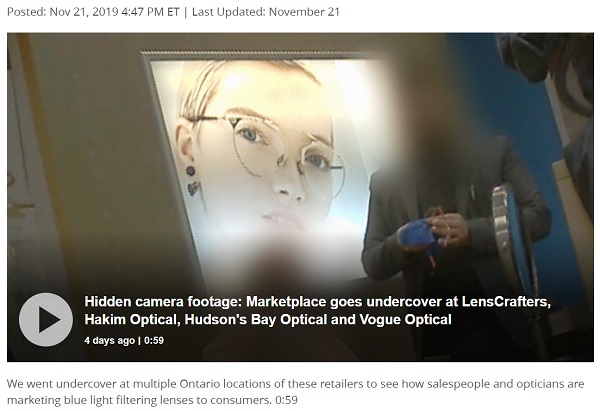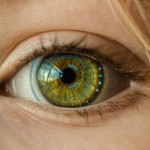The CBC (Canadian Broadcasting Corporation) does a show called Marketplace which is intended to expose deceptive business tactics and scams in the marketplace.
They recently did a show called “Why You Don’t Need Blue Light Lenses” which is about the technology invented by ophthalmic lenses manufacturers to help reduce something known as digital eye strain by blocking blue light from digital devices.
In this article I will be offering a critique of their video with timestamps to the precise points of the video I will be discussing.
Disclaimer: I am not for or against blue light filtering lenses. I have no financial incentive to either promote or disparage this technology. I simply found Marketplace video in question to be particularly deceiving and wanted to share my thoughts about it.
0:00 to 0:30
Just a general introduction. Nothing wrong yet.
Verdict: Fine
0:34
“We’re taking a hard look at a filter that’s suppose to block the blue light from screens”
This is the first misleading statement of the video.
By inserting the words ‘suppose to’ in that sentence, the narrator is presupposing that these lenses don’t actually do what they’re suppose to do. In fact, there is absolutely no disputing that every manufactures blue filters effectively block all the wavelengths they claim to block.
The issue as stated in their title is “Why you don’t need blue light lenses”, not “Do blue light lenses actually block blue light”.
Verdict: Misleading Statement
0:40 – 0:53
Two salespeople/opticians explaining how the lenses work.
Verdict: Fine
0:53 – 1:16
Explaining that they plan to visit about 12 different stores.
Keep this in mind as you watch their undercover footage later on in the video. They were only able to collect footage on about a hand full on people (which was heavily edited to suit their narrative). What happened in the rest of the stores? They weren’t able to trap the salespeople into saying the wrong things I guess.
Verdict: Fine
1:16 – 1:45
More salespeople/opticians explaining and demonstrating how the lenses work.
Verdict: Fine
1:45 – 2:10
Here they film people in mid-sentence saying scary words. They don’t show any context as to what was asked of the salespeople, nor what the salespeople said before and after the clips.
The first guy says “It causes retinal damage”, and that’s the entire clip. There is absolutely nothing to tell the viewer what he was talking about when he said that, or what question he was asked to get him on that topic. Could the undercover shopped have been asking about the effects of UV on the eyes?
The next clip is of a person saying “It damages your eyes obviously” and then cuts off before she says anything else. So what is she talking about? Why wouldn’t they show both the question and the answer in the video? I’m very skeptical of what was said to this lady as speaking to customers in that tone of voice is not typical.
It’s the same for the next clip which begins with “like macular degeneration, like when it’s damage to your retinas, things like that”. They didn’t even do this person the courtesy of quoting her from the beginning of her sentence.
Before cutting to the last clip they prefaced it by stating that we were about to hear ‘The C-Word”. This is to associate the man who is about to speak with being vulgar and using offensive language even though he says “cancer” instead of the word they were trying to make us think of.
Granted, if this salesperson was actually asked about blue light, he wrong to mention cancer as a risk.
Verdict: Fear Mongering, Quoting Out-of-Context, Misleading
2:10 – 2:13
“Yikes, so what does it cost to save our eyes?” spoken sarcastically.
This line was inserted to continue the narrative that they are fabricating. First they establish that the public is being intentionally told scary lies about the dangers of blue light (with out-of-context quotes), then they establish that this is all done in order to siphon money from consumers.
Verdict: Intentionally deceptive
2:14 – 2:20
Here they show a few salespeople/opticians giving quotes. The problem is the same as what they were doing before. There is no information provided telling us what is actually being quoted. They could have been asking how much Transition lenses would cost, or how much upgrading to thinner lenses would be.
Besides, except for the one which was $100, the other quotes were very reasonable.
Verdict: Quoting Out-of-Context
2:33 – 3:00
They’ve traveled to Philadelphia and are talking to 3 people on the street. I’ll leave it up to you to decide if any of them are genuine or if they were told what to say.
Verdict: Irrelevant/Scripted
3:00 – 3:30
They introduce Sunir J. Garg, MD, an American board certified ophthalmologist, who they are about to interview.
Verdict: Fine
3:30 – 3:35
The first question:
“We keep hearing the same thing about blue light filter lenses, is this a new thing?”
What a useless question. Remember that the title of the video is ‘Why You Don’t Need Blue Light Lenses’. How does asking if it’s new have any relevance to whether it’s something people need or not?
Also, it’s vague. The term ‘new’ is relative. The blue light blocking coating Crizal Prevencia by Essilor was released in 2013. In the optical industry, that’s not really new.
Verdict: Stupid Question
Nevertheless, here is Dr. Garg’s response:
3:35 – 3:43
“It is a new thing and it’s all over the internet. I can’t even open up you know, any website without you know, hey maybe you want to these blue light blocking lenses”.
Ok, where do we start on this one…
If he stopped at ‘It’s a new thing”, maybe he could be forgiven for thinking that optical tech release in 2013 is new.
But then he added “and it’s all over the internet”. This is what gives away that he is just coached answer. Something being big on the internet is not how you gauge if it is new. Then he continues to baffle with the rest of the answer which takes his answer from strange to downright cringe-worthy.
“I can’t even open up you know, any website without you know, hey maybe you want to these blue light blocking lenses.” Wow. I would hope that an eye surgeon would have less time to be on the internet as I do, especially given that I’m an online blogger. Being on the internet is literally what I do, and I have never been asked to buy blue light blocking lenses, let alone being constantly badgered to buy them from every website. I just can’t see what he’s talking about.
His answer is just so over-the-top and so disconnected from the question that unless he has some kind of tangentiality disorder, he has to have been instructed to say those things.
Verdict: Obviously Scripted Answer
03:45 – 4:05
More clips of salespeople/opticians explaining how high-energy visible blue light affects the eyes.
Verdict: Fine
4:05 – 4:09
The second question for the eye specialist:
“We heard that several times. Is blue light from your screens harmful?”
There we go! Now that’s a relevant question!
Verdict: Good!
4:09 – 4:25
And the answer:
“No. It’s not. And I don’t know where that’s come from and why it’s taking off so much because it’s not data driven. I can’t fault them because I’m sure they’re getting a little info sheet that says you know what, here’s 3 talking points about blue light blocking lenses.”
This is a pretty good answer. I’m glad that he brought up the point that the salespeople offering blue light filter lenses are not to blame for the rise of this product.
The manufactures of blue light filter lenses are the big lens companies that together dominate the industry. They are Essilor, Nikon, Hoya, Ziess, and Rodenstock, etc. They sell lenses to optical stores and provide them with information about their lenses which is then relayed to customers through the optical store staff.
If its anybody who this video should be seeking answers from, it’s companies like Essilor, Nikon, etc., who actually developed blue light attenuating lens technology, as well as the marketing material for it.
But instead of doing interviews with representatives from those companies they decided to ambush and vilify regular people just doing what they were told to do by their employers.
Verdict: Pretty good answer!
4:26 – 4:45
Here Dr. Garg gives his reason for why people who spend all day working at computers feel eye strain but again, sadly, it misses the mark.
Dr. Garg’s answer:
Dry eyes at the computer
He says that the reason why our eyes become uncomfortable after long hours at the computer is because of dry eyes brought on my reduced blink rate. Although this does happen and can lead to dry, gritty, red eyes, it’s not the cause for eye strain.
The rest of the answer:
Eye strain at the computer
The way the eyes work is when we’re looking in the distance, the ciliary muscles and the Crystalline Lens are at rest. The muscles are relaxed and the lens is in a relatively flat shape.
When we look up close, the muscles must engage in order to change the shape of the lens into a more curved shape. This requires sustained effort on the part of the muscles for as long as we’re looking up close. And the closer we look, the harder it gets for the muscles.
Spending hours and hours looking at a computer makes the ciliary muscles very tired. When they are strained they can start to become lazy, causing your vision to blur and your eyes to feel pressure around/inside them.
What about blue light?
That’s still largely up in the air according to scientific studies. Some studies have shown that wearing blue light filtering lenses helps reduce the amount of eyestrain experienced at the computer, and the other studies show no improvement.
Similarly, if you ask people who have used blue light filtering lenses, you will get some people who swear by them and other who will say they don’t help very much.
Blue light filtering lenses are not a magic solution to all eye problems experienced at the computer, but if they can help you, than that’s a great resource to have at your disposal.
One thing is unanimously agreed upon, science and all, blue light filtering lenses do not harm you in any way.
Verdict: Over-simplified/intentionally incomplete answer
Let’s continue with the video.
4:45 – 5:02
Here Dr. Garg pitches the 20/20/20 Rule as being the solution to digital eye strain. This is the rules that says that every 20 minutes, take a 20 second break and look at something at least 20 feet away.
I strongly urge you to read this interesting article in the Optometry Times about the origins of the 20/20/20 rule.
In an earlier response by Dr. Garg he mentioned that use of blue light filtering lenses was not “data driven”. This is, of course, despite numerous studies showing at least some evidence suggesting their benefits (see links below).
By contrast, there has been absolutely no research done to validate/invalidate the 20/20/20 in any way.
That being said, I am not against the 20/20/20 Rule. In fact, I think a 20 second break every 20 minutes is not long enough to prevent digital eye strain. I bring this up to show that Dr. Garg cited the lack of evidence to disparage one thing, and instead recommended something with even less evidence.
Verdict: Scientific double standard on full display
5:02 – 6:02
This is the most despicable segment of the entire video. Here they put on scary background music and rip into two regular salespeople for the way they explained the effects of blue light on the eyes. They ridicule them, make fun of their answers, and make them sound manipulative and unethical.
The second person they featured here obviously didn’t speak English as her first language, yet the picked apart the words she chose to convey her thoughts as though she was intentionally trying to defraud the customer with misinformation.

CBC Marketplace, may I remind you that the salespeople in your ambush videos are not the ones who invented these lenses! They probably honestly believe what was told to them by the lens manufacturers and are trying to help their customers by passing on that information.
Verdict: Vilifying innocent employees, despicable
6:03 – 6:49
Here they set up a discussion about the link between blue light and macular degeneration by showing some more clips. Surprisingly, they actually included a clip of a salesperson giving an answer in context (mind blown!), the only one in the entire video.
Verdict: Quoting Out-of-Context (save one)
6:49 – 7:08
Dr. Grag says:
“Unfortunately she’s just wrong, and here’s no evidence at all that blue light from the screens is going to cause macular degeneration.”
Granted, there are no studies that definitively establish blue light as causing macular degeneration. Rather, there is a mounting body of evidence that blue light does negatively affect the retina and it is postulated that it may contribute to macular degeneration or macular degeneration-like conditions.
For your interest, here are some studies on the topic:
- The effect of visual blue light on mitochondrial function associated with retinal ganglions cells.
- Daily blue-light exposure shortens lifespan and causes brain neurodegeneration in Drosophila.
- Influence of blue light from visual display terminals on human ocular surface
- Role of short-wavelength filtering lenses in delaying myopia progression and amelioration of asthenopia in juveniles
- Blue Light Action on Mitochondria Leads to Cell Death by Necroptosis
- The effect of blue light on human retinal pigment epithelium cells α1D subunit protein expression and vascular endothelial growth factor and basic fibroblast growth factor secretion in vitro
- Functional and morphological evaluation of blue light-emitting diode-induced retinal degeneration in mice
- Activated microglia in human retinitis pigmentosa, late-onset retinal degeneration, and age-related macular degeneration
- The Involvement of the Oxidative Stress in Murine Blue LED Light-Induced Retinal Damage Model
- Blue light-induced retinal lesions, intraretinal vascular leakage and edema formation in the all-cone mouse retina
- Effects of white light‐emitting diode (LED) exposure on retinal pigment epithelium in vivo
- Mitochondria-derived reactive oxygen species mediate blue light-induced death of retinal pigment epithelial cells
- Involvement of XBP1s in Blue Light-Induced A2E-Containing Retinal Pigment Epithelium Cell Death
- Bystander effects elicited by single-cell photo-oxidative blue-light stimulation in retinal pigment epithelium cell networks
- Damage of photoreceptor-derived cells in culture induced by light emitting diode-derived blue light
- Blue light induces mitochondrial DNA damage and free radical production in epithelial cells
Verdict: Dismiss a mounting body of scientific evidence
7:08 – 7:33
Dr. Garg discusses things known to reduce the risk of macular degeneration. He lists:
-
Eating a proper diet
-
Foods high in omege-3 fatty acids
-
Eating stuff like brocoli spinach and kale 3 servings per week
So… He’s not going to mention protecting the eyes from UV light? No mention controlling body-weight and living and an active lifestyle? No mention of smoking? Maybe he did but CBC Marketplace didn’t feel it necessary to include in their video.
7:33 – 8:14
Now they bring up the studies. They quote a salesperson saying:
“Right now there is some studies suggesting that blue light coming from the devices is actually causing damage to your eyes in a similar way that UV light does.”
What this person said is 100% true! (see links to studies above)
Dr. Garg refutes this by saying that these studies were not conducted on live humans, but rather, on mice or human tissue samples.
To me this is very concerning. In fact, it sounds like a tacit admission that blue light is in fact dangerous. Medical science has shown time and time again that things that are harmful to animal test subjects are usually similarly harmful to humans. That’s part and parcel of how almost all of our medications are developed.
Verdict: Deflection and obfuscation of the truth
8:15 – 8:25
As they show various in-store and online marketing material about blue light lenses, the narrator says:
“The marketing industry in stores also sends the same messages about the dangers of blue light from your screen and so do the company websites”
Ok, I’ll bite. Let’s see if this marketing material is in fact touting the (and I quote) “same messages about dangers of blue light.”
Here’s what they showed:
- Pamphlet saying: “The CHOICE is CLEAR – Introducing – CHOICE BluSelect” (Vogue Optical)
- Pamphlet saying: “Your eyes are vulnerable to powerful light rays – Choose VISION EASE Clear Blue Filter Lenses” (Hudson’s Bay Optical)
- Poster saying: “BLUE SHIELD PROTECTIVE LENSES – Protects your eyes from Smart Phones, Tablets, LED Devices, Computer Screens, Televisions and The Sun” (Hakim Optical)
- Poster saying: “TAKE THE STRAIN OUT OF SCREEN TIME – Ask your doctor about BLUE IQ CLEAR lenses” (LensCrafters)
Curious, no mention of retinal damage or macular degeneration here…
None were found on the websites either except for Vogue Optical’s as seen here in the video:

Bad Vogue Optical!
At least they have since pulled this snippet from their website.
Verdict: Exaggeration
8:25 – 8:30
The interviewer asks Dr. Garg:
“Of everything that you’ve seen so far, what stands out?”.
Verdict: OK
8:30 – 8:39
Dr. Garg’s response:
“You know, I think people are exaggerating the problem and are misleading their customers. I think it’s mostly benefiting the companies that are selling these things, truthfully.”
Oh you don’t say? Of course it’s the companies selling these products that are pushing it. It doesn’t take an ophthalmologist to figure that one out!
So CBC Marketplace, how about not putting innocent and unsuspecting sales floor employees in your overly sensationalized and stigmatizing videos? Go after the big companies and ask them tough questions about their products, their research, and their claims.
Verdict: Stop villainizing the wrong people!
8:40 – 9:00
So far the video has spent 8 minutes and 40 seconds talking about how consumers are being duped with false claims about blue light blocking lenses. Surely they’re going to spend the same amount of time examining the other side of the story from the retailers and the manufacturers perspective, right?
Nah, here’s 20 seconds glossing over any possible counter argument.
Verdict: Biased reporting
9:03 – 10:18
Now they travel to England to meet with professor John O’Hagan, an optical radiation expert.
He measures the spectrum of light coming from a smartphone and they briefly show the results. It is difficult to read the axis labels and values so I have superimposed them in this screenshot.

Professor O’Hagan’s only analysis of the data was:
“the levels are very low. It’s a very low output.”
Then he goes on to conclude:
“There is no evidence that the blue light from your mobile device is harmful.”
I wish they had used some actual figures here instead of “very low” which is practically meaningless, but it is a good thing and I for one am glad to hear that. However, the video conveniently avoided any analysis or discussion of computer monitors.
At home I use a 24″ computer monitor which has an area of 246 square inches. An average smartphone has a 5.5″ screen which is equal to 13 square inches. That means that the area of my computer monitor is 19X bigger than an average smartphone.
I wonder what 19 X “very low” is…
The segment ends by Professor O’Hagan saying:
“we looked at a whole range of different phones, tablets, screens, we didn’t find anything that gave us cause for concern”
Then the narrator says:
“O’Hagan’s tests determined that screens are harmless”.
Well that’s a relief. But wait…
What about the known and proven effect that screen time has on our sleep cycle?
Why hasn’t this video mention that at all? Well because it’s not as scandalous of course. Don’t worry, they’ll do about a 10 second mention of it in passing at the end of the video.
I for one don’t think it’s something that should be glossed over so non-nonchalantly. Here’s some links to articles on the topic if you’re interested.
Q&A: Why Is Blue Light before Bedtime Bad for Sleep?
The Dangers of Using Electronics at Night and What We Can Do About It
Blue Light and Sleep: What’s the Connection?
Systematic review of light exposure impact on human circadian rhythm
Effects of blue light on the circadian system and eye physiology
10:18 – 11:45
Here they address the false claims that blue light exposure increases the risk of certain types of cancers. On this one they nailed it. In all the scientific research I’ve done, and the optometrists and ophthalmologists I’ve spoken to, there is no evidence at all to substantiate claims of increased risk of cancer.
Although for the most part this video is sensationalist and tarnishes the honest efforts of regular people just doing their jobs, they did a great job catching this and getting it out of in-store marketing materials.
Verdict: Good job!
11:48 – 12:03
And here’s our 20 second mention of all the harmful effects that blue light has on our circadian rhythm, sleep quality, etc.
In my opinion, on this point alone it justifies getting blue light filtering lenses.
They suggest that an easier fix is to turn on night mode of your smartphone. But once again they seem to be ignoring that most people use computers at work, not their smartphone.
Besides, if you use 1-2 computers at work, a smartphone, a tablet, a laptop, a home computer, 1-2 television, what’s simpler, constantly adjusting the screen settings on all your devices, or getting blue light filtering lenses? Up to you I guess.
Verdict: Ignoring proven health benefits of filtering blue light
12:10 – 12:27
Dr. Garg ends by dismissing blue light blocking lenses and all the complications that blue light causes in your brain chemistry and gives his pro tips:
-
Take a break periodically when you’re doing things
-
Start quieting down before night time
-
Eat a good diet, exercise and not smoke
That’s it? For all the talk about macular degeneration and cancer in this video, you would have thought that they would have mentioned the one big, obvious, omnipresent threat for both conditions: UV light.
My guess is that they were nervous about that topic because UVA light (10nm – 400nm) and high energy blue light (400nm to 450nm) are pretty close, especially in that 400nm range.
Verdict: Omitting facts that challenge their narrative
And that’s the video.
To sum up:
- I’m entirely positive that all their undercover clips were edited to make the salespeople sound worse than they actually were
- They should be ashamed for going after regular the people who have absolutely no power or say in what goes on in their stores
- They brushed over or completely ignored any counterargument to their own
- They didn’t go after the manufactures at all (the ones controlling the marketing)
- The interview with their expert ophthalmologist seemed highly scripted and edited
But on the up-side they did get the word ‘cancer’ stricken from some pamphlets.
As an aside, I would just like to mention that they are the CBC, the Canadian Broadcasting Corporation, and they flew all the way to Philadelphia and to England for their expert interviews. Since, they’re funded by the Canadian government, how about they feature some Canadian experts in their videos? Or do they think Canada doesn’t have such expertise?
This video has stirred up a lot of controversy in optical stores. Now that you know my thoughts on the subject, I’m eager to hear yours. Please leave them in the comments below and we can discuss!
Details about the show:






2 Responses
Pat McEntee
Your own editorializing does exactly what you claim the program did. It is only at the very end when you identify UV light as a problem did you get your critiqe right.
No, I did not read every citation. What I did read did not support your contentions or were ambilelant. The first cite claiming blue light was harmful involved looking at flies left under a single wave length light. Aside from humans not living under single wavelength light, our eyes are very different in structure from insects. When humans have been subjected to single light sources for long periods, such as prisoners with an incandescent source, there have been eye problems recorded afterwards.
UV light is harmful; no argument. That does not mean there is a correlation to blue spectrum light though. If you want blue blockers then get them. Criticizing others because they challenge your point of unsubstantiated view is even worse than any errors in the news article you dislike.
Julie
Hi Pat, I agree this one was of my least balanced articles. Besides that, I’m not entirely sure what you’re trying to say. I’m sorry.